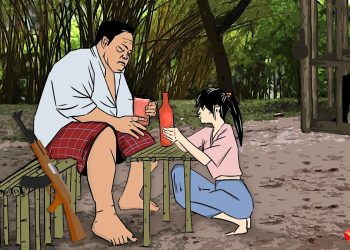RANGOON — The Northern Alliance urged civilians in northern Shan State and along the Burma-China border to exercise caution on Wednesday, and said that ongoing clashes between the coalition of ethnic armed groups and the Burma Army in the Kokang Self-administered Zone were likely to intensify.
“The clashes are likely to be quite serious, so we would like to request visitors and locals take extra caution if they want to travel,” Brig-Gen Tar Bone Kyaw, General Secretary of the Ta’ang National Liberation Army (TNLA) and Northern Alliance spokesperson, told The Irrawaddy.
The Northern Alliance consists of the Kachin Independence Army (KIA), the Kokang Myanmar National Democratic Alliance Army (MNDAA), the TNLA, and the Arakan Army (AA).
Brig-Gen Tar Bone Kyaw justified recent assaults in Laukkai, in the Kokang Self-Administered Zone of Shan State, by saying that the Burma Army had denied the groups the chance to join the peace process and had been conducting large-scale offensives in MNDAA- and TNLA-controlled areas.
“I’d like to request our people to have a deep sympathetic understanding towards us for the things we have done because of intolerable military pressure,” he said. “We have no choice if military pressures are intolerably mounting.”
The Burma Army did not make public statements about clashes with the MNDAA in January and February.
The Office of the Commander-in-Chief released a statement on Monday, however, saying that the Burma Army had clashed with the MNDAA 56 times between Jan. 19 and Feb. 11.
Northern Alliance troops raided the Yan Long Zhai (also spelled Yan Lon Kyaing) border gate on the Burma-China border and military outposts, police stations, and hotels in Laukkai on early Monday morning.
In response, the Burma Army brought in reinforcements and armored tanks, and Northern Alliance troops withdrew from Yan Long Zhai Gate and Laukkai.
Clashes continued in the mountains between Laukkai and Maw Htike on Tuesday morning.
“The Burma Army was shelling us with 102 millimeter and 105 millimeter launchers between Laukkai and Maw Htike, and was occupying one hill after another,” said Brig-Gen Tar Bong Kyaw.
On Monday, Burma’s State Counselor’s Office and the Office of the Commander-in-Chief released separate statements, both claiming that five civilians and five traffic police died in the clashes.
Around 20 burned bodies were found, the statement said, and four traffic police were taken hostage.
The statement from the Office of the Commander-in-Chief said that the MNDAA, TNLA, and AA would not be required to sign the Nationwide Ceasefire Agreement (NCA) to attend the 21st Century Panglong Peace Conference on the condition that they announce giving up their armed struggle.
Brig-Gen Tar Bone Kyaw said the three ethnic armed groups would not disarm to join the peace process, but demanded that ceasefire negotiations be held and that they be invited to join the peace process.
State Counselor Daw Aung San Suu Kyi, in her Monday statement, also urged the warring groups to abandon armed clashes and join the peace negotiation table and lamented the plight of locals.
On Nov. 20 last year, Northern Alliance troops launched attacks on military outposts and police posts at the Muse 105th Mile Border Trade Zone and in Mong Ko in northern Shan State, and said that the attacks were intended to counter the Burma Army’s continuous assaults on their mountain outposts. Since then, military tensions have remained high in the area.
According to government figures, over 40 civilians were killed and many more were injured in the clashes.

















